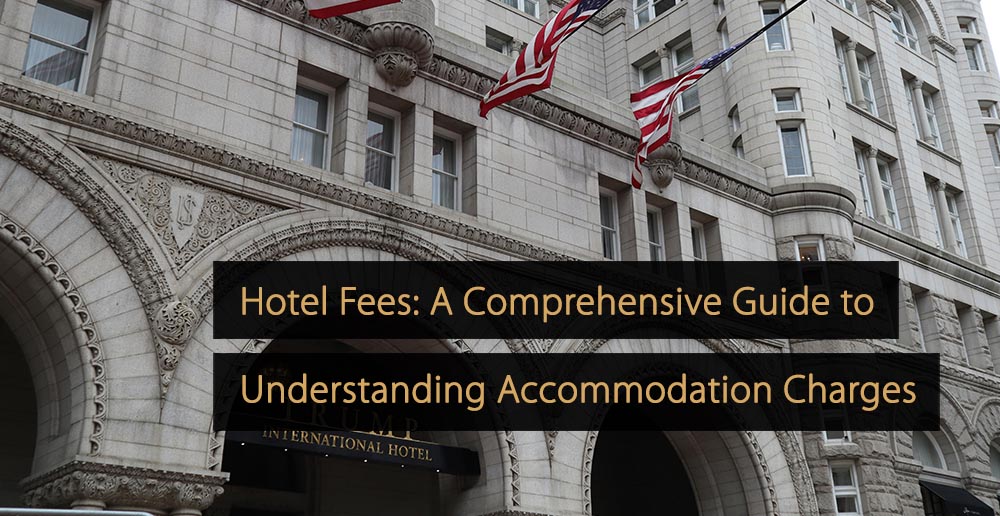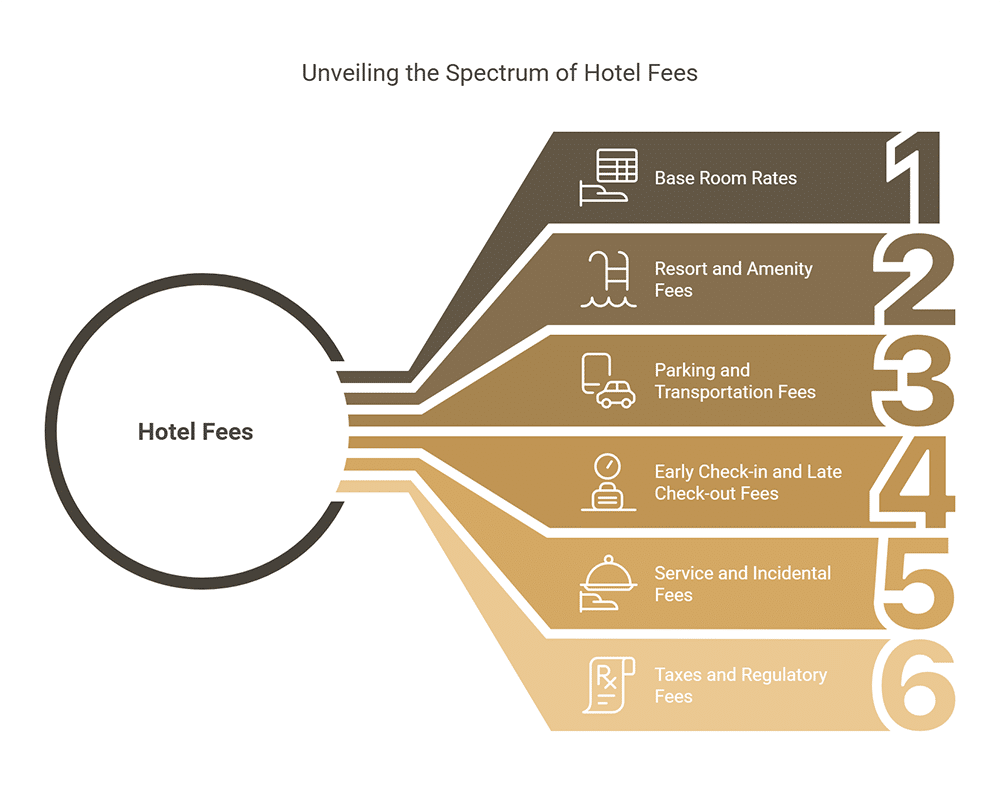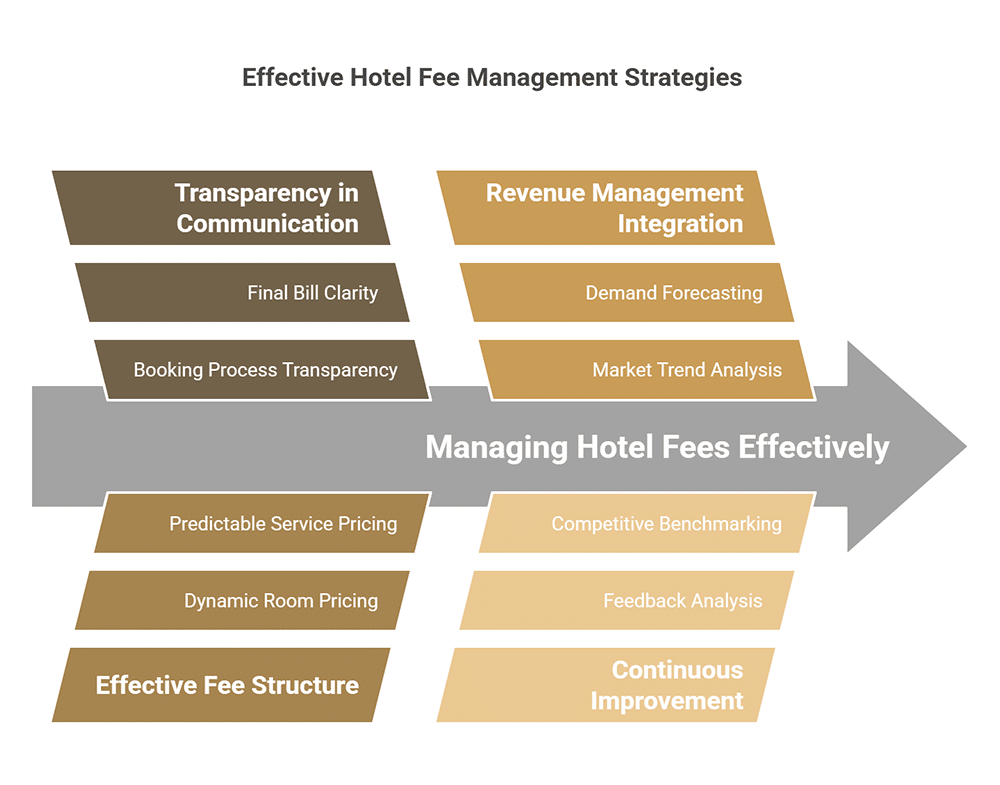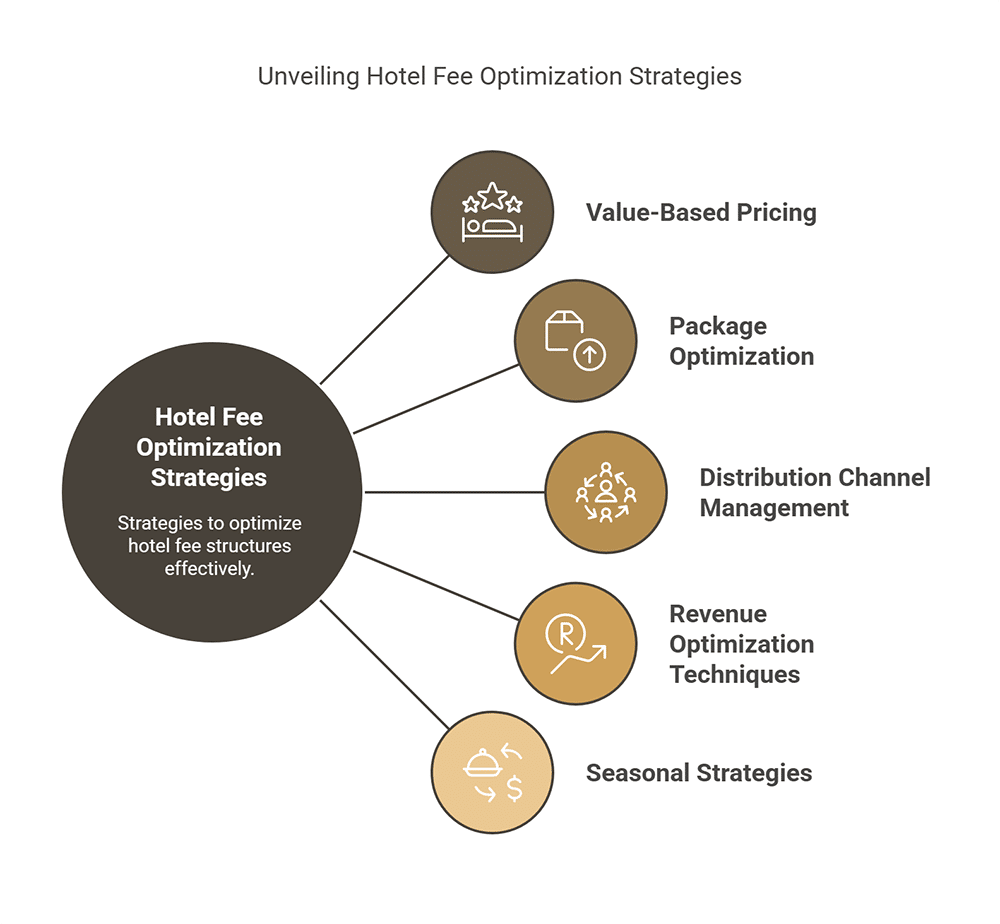Hotel fees are the various charges guests face when staying at an accommodation business, like a hotel or resort. They can range from the basic room rate and fees for using hotel amenities, to parking fees and taxes.
For hotels, it is important to understand and make strategic use of hotel fees to maximize revenue from guests. At the same time, fees need to be managed carefully to maintain high levels of guest satisfaction.
In this article, you can explore specific charges commonly issued by hotels, learn how to manage these fees carefully to keep guests happy, and examine optimization techniques and best practices for implementation.
Table of Contents:
- Understanding the Role of Hotel Fees
- The Importance of Hotel Fees for Revenue Management
- 6 Common Types of Hotel Fees
- How to Manage Hotel Fees Effectively
- 5 Essential Hotel Fee Optimization Strategies
- Key Hotel Fee Management Best Practices
- Advanced Hotel Fee Optimization Techniques
- Considerations When Starting a Hotel Business
- How to Source Finance for Your Hotel Business
Understanding the Role of Hotel Fees
Hotel fees are the various stay charges guests may run into when they book accommodation and stay in a hotel. These charges cover not only the room, but the additional services and facilities guests use.
For example, in addition to paying basic room rates, guests may also pay to access room service and to use hotel facilities. On top of this, they may need to pay taxes and parking fees.
Some of these charges are out of a hotel’s direct control, like taxes, but most of these accommodation charges are ways of generating additional revenue. However, hotels do need to be transparent about these extra fees.
The Importance of Hotel Fees for Revenue Management
Hotel fees are an important part of revenue management strategies. These fees enable hotels to maximize key performance metrics, like total revenue per available room (TRevPAR) and average revenue per account (ARPA).
While these various lodging costs add to the total amount hotel guests pay, they allow hotels to generate more revenue from each guest. They also provide hotels with the opportunity to diversify revenue streams.
Effective management of hotel fees can make it easier for hotels to generate profit and reinvest money into hotel improvements. However, it is important to balance this against guest expectations around total expenditure.
6 Common Types of Hotel Fees
In these sections, you can read about some of the most common hotel fees and why they matter to hotels and guests.
1. Base Room Rate
Base room rates are the main stay charges guests encounter when using a hotel. In most hotels, room rates will vary based on the anticipated level of demand, with higher prices being charged during high-demand periods.
The room rate is the most important of all hotel fees, making up the majority of revenue in the majority of accommodation properties. For guests, the room rate can be seen as the absolute minimum they will pay during a stay.
Room rates are usually set using a dynamic pricing strategy, with prices chosen based on market conditions, competitor prices and operating costs. Many hotels use sophisticated revenue management tools to automatically adjust prices.
Video: How Hotels Price Rooms
2. Amenity and Resort Fees
Amenity and resort fees describe the various hotel fees associated with using different hotel facilities and services. These may include charges related to internet access, pool access, gym access and more.
For hotels, these extra accommodation charges help to generate additional income. By diversifying revenue sources, you can extract more revenue from each hotel guest, often resulting in greater profit margins.
From the perspective of people staying in a hotel, these extra charges are optional but enhance the guest experience. However, hotels need to set the fees carefully to maintain fair pricing, based on operating costs and usage data.
3. Parking and Transportation Fees
Hotel fees associated with parking and transportation can take many forms. There may be stay charges for the parking lot and valet parking, or airport transfers fees and charges for accessing local transportation services.
These lodging costs are worthwhile for many guests because the availability of parking at the hotel is a huge convenience. For hotels, it helps to recoup some of the costs associated with using this space for parking.
In terms of additional transportation costs, your hotel may be able to enter into partnerships with local bus, coach or taxi services. This is especially beneficial for helping guests get to the airport.
4. Check-In and Check-Out Fees
Many properties charge additional hotel fees in exchange for early check-ins and late check-outs. This helps to cover the extra costs linked with having hotel staff available outside of the usual check-in and check-out hours.
For guests, these accommodation charges are often paid willingly to access the convenience of checking in and out at a preferred time. This can be especially valuable if guests have early or late flight times.
It is important for hotels to continually analyze early check-in and check-out options to ensure fees are covering the extra labor expenses. It is also essential to assess the impact on guest satisfaction.
5. Incidental and Service Fees
Incidental and service fees are hotel fees connected to additional services used during a stay. Some of the biggest examples include room service, corporate services, laundry services and hotel minibar items.
These services can all play a key role in enhancing the guest experience, while providing hotels with additional revenue. However, hotels need to be transparent and upfront about any fees associated with using these services.
Continual analysis of how these services are used and the operational costs involved can make it easier to decide appropriate charges. Hotels can either charge these fees at the point of use, or add them to the final bill.
6. Taxes and Regulatory Fees
Taxes and regulatory fees are the accommodation charges levied on guests by local, regional, or national governments. Examples of this include hotel tax, lodging tax and occupancy tax.
Unlike most other hotel fees, these charges are generally outside of the hotel’s control. However, it is vital that hotels include them within bills and communicate these taxes to guests to maintain compliance with tax legislation.
Taxes must also be accurately calculated, so most hotels not only use technology for this, but also carry out regular tax audits. It is vital to identify any guests or visitors who may be exempt, too.
How to Manage Hotel Fees Effectively
In addition to understanding the main types of hotel fees, you must also learn how to effectively manage these fees.
Transparency in Communication
Transparent communication about hotel fees helps to clearly set guest expectations. You need to take the time to explain what fees guests may encounter, when they may face these fees and how they can pay.
Communicating these fees in a transparent way allows guests to fully understand the accommodation charges. It also helps to prevent situations where guests are caught out by unexpected fees.
Transparency should begin during the booking process and continue through the pre-arrival period, via email communication. Charges should also be clearly explained on the final bill guests are presented when they check out.
Effective Hotel Fee Structure
An effective hotel fee structure will be designed optimize financial outcomes, taking into account operational costs and market conditions. It will generally include separation of room rates from additional accommodation charges.
Having an effective fee structure in place is essential for revenue management purposes. It allows you to use dynamic pricing for rooms, while creating a more fixed and predictable pricing strategy for extra services.
The biggest considerations are the amount you spend to provide services, including labor and maintenance costs. You may also need to design your fee structure based around wider market trends and what rivals are charging.
Optimization of Package Deals
Package deals are a way to bundle together the price of the room and some of the additional hotel fees. For example, you could sell a package including the room, gym access and access to corporate facilities.
The use of packages is a great way to cross-sell the extra services you offer. Packages can also increase transparency and make your revenue more predictable, as customers pay for the entire package upfront.
Packages can be used strategically to increase demand during historic low-demand periods. These deals can also be used to specifically target members of your customer loyalty program, or past guests you want to return.
Revenue Management Integration
Hotel fees need to be integrated within a wider revenue management strategy. This means creating a robust system to forecast demand, analyze market trends, and identify competitors’ pricing strategies.
Integrating your hotel fees with your revenue management software and strategies allows you to set pricing based on available evidence. This can be important for maintaining high levels of demand.
Revenue management software can be used to make automated, real-time adjustments to room rates, while additional accommodation charges are generally less dynamic, but can be adjusted at key times, based on market data.
Feedback Collection and Analysis
Guest feedback can provide valuable information on your hotel fees and how they are perceived. By collecting and analyzing this data, you can potentially learn valuable lessons about your current approach.
Obtaining feedback from hotel guests is essential for understanding how your customers feel about the lodging costs they face. It can provide insight into which charges they feel are fair and which they are unhappy with.
This information then allows you to make tactical adjustments to your approach. You can also take the time to track feedback for rival hotels and see what their guests are saying too.
Continuous Hotel Fee Improvement
You need to continuously evaluate your approach to hotel fees and refine your fee structure as you go. Use all of the available data to track performance and make changes to optimize revenue management.
Continuous improvement is a fundamental part of the hotel industry. Guest expectations change over time, as do competitors’ pricing strategies, so what used to work well might not always bring success.
Over time, you should also keep a record of hotel fee adjustments and their subsequent impact on your financial results. This may make it easier to identify precisely how fees impact your profit margins.
Comprehensive Training
Provide your employees with comprehensive training around hotel fees. Make sure all of your hotel staff understand the full range of stay charges guests may incur and can confidently explain them.
This training is important because guests may have questions about services and fees during their stay. You want staff to provide them with accurate answers and to help them to make informed decisions.
In addition to ensuring your employees are knowledgeable about hotel fees, you should also make sure your training activities equip them with the skills to upsell and cross sell, so they can encourage guests to use extra services.
5 Essential Hotel Fee Optimization Strategies
Here, you can explore some of the most vital strategies for optimizing your hotel fee strategy.
1. Value-Based Pricing
With a value-based pricing strategy, you set hotel fees based on perceptions of the value amenities and services add. In other words, you are basing your pricing strategy around the overall quality of the guest experience.
Value-based pricing is an important concept because it helps to ground your approach to hotel fees via guests’ perceptions. This can prevent situations where the fees you charge feel out of step with what guests expect to pay.
To implement a value-based pricing structure effectively, you need to have a deep understanding of guest opinions. This means collecting feedback regularly, analyzing this feedback and using rivals as a benchmark.
2. Package Optimization
Making packages, where hotel fees are bundled in with the base price, can help to create a compelling proposition for many guests. Packages can sometimes make the value on offer easier for guests to recognize.
Optimizing your use of packages can be important for increasing the average amount of revenue you generate from each guest. This, in turn, allows you to optimize your financial results and diversify revenue.
In some cases, selling packages can convince guests to use services they otherwise would have ignored. You can also target packages at very specific demographics, like families with children, or business travelers.
3. Distribution Channel Management
Hotel fees need to be carefully managed across multiple distribution channels. This can include using rate parity strategies to ensure room rates are consistent across all channels and updated in real-time.
Managing multiple distribution channels is important because hotels need to maximize exposure. While direct bookings are optimal for financial results, third-party platforms can generate additional bookings.
Away from room rates, it can be advantageous to experiment with different approaches to hotel fees on different channels. For instance, you might target business customers on one channels and promote specific services to them.
4. Revenue Optimization Techniques
Advanced approaches to revenue optimization make effective use of data analytics through specialist software. Some of the best solutions in this area also make use of artificial intelligence for automation.
Taking a comprehensive approach to revenue optimization can help you to generate the best possible financial outcomes. When AI is used, this can potentially be achieved without significantly increasing initial costs.
Make use of multiple key performance indicators, use real-time data analytics, and focus on optimizing total guest value. Deploy software so adjustments to pricing can be made in the precise moment they will have the biggest impact.
Video: How to do Revenue Management for Hotels? Improve ADR and Occupancy
5. Seasonal Strategies
Your overall approach to hotel fees should be dynamic, with changes occurring throughout the year. Use seasonal demand patterns to forecast the level of interest in your hotel services and change approach accordingly.
Seasonal strategies are valuable because hotels do not experience static demand. You want to maximize revenue during periods of high demand and you want to use strategic discounts to encourage bookings when demand is low.
Consider waiving some of your usual hotel fees during the low season, in order to avoid unnecessary vacancies. When demand is high, make sure you are upselling and cross selling to boost metrics like TRevPAR.
Key Hotel Fee Management Best Practices
Below, you will find an overview of best practices for managing hotel fees:
- Strategic Fee Structures: Consider your own revenue management objectives and guest satisfaction levels. Create and continually evolve your fee structure, balancing these competing needs.
- Revenue Management Integration: Implement a dynamic approach to room rates and integrate other hotel fees with your revenue management strategy. Use specialist software to continually adjust pricing, based on demand.
- Guest Communication: Make sure you are upfront about the hotel fees guests face. Take the time to explain the different accommodation charges guests may incur so you set realistic expectations.
- Distribution Channel Optimization: Use a rate parity strategy to standardize room rates across different distribution channels. Consider using a unique approach to hotel fees to optimize revenue from each channel.
- Feedback Analysis: Continually request and gather feedback from guests about your approach to hotel fees. Analyze their feedback, look for trends and use this data to inform your pricing decisions.
- Performance Monitoring: Track key performance indicators related to hotel fees, such as TRevPAR. Evaluate the impact fee changes have on your financial outcomes and optimize pricing accordingly.
Advanced Hotel Fee Optimization Techniques
Here, you can explore some of the more advanced strategies for optimizing your hotel fees:
- Strategic Pricing: Use a combination of forecasting, feedback, and market analysis to strategically set your hotel fees. Consider the amenities you offer and how they are perceived by guests.
- Seasonal Adjustments: Use a dynamic approach to room rates and hotel fees in general. This allows you to adjust pricing based on seasonal fluctuations in demand, so you can maximize revenue in high-demand periods.
- Market Segmentation: Break down your market into different segments, based on shared traits. Use this approach to create a varied pricing structure, focusing on ways to appeal to each segment.
- Loyalty Programs: Implement a customer loyalty program and integrate hotel fees within this. Consider offering packages or special deals to guests who stay with you multiple times, as an incentive to keep booking.
- Hotel Technology: Make use of revenue management software, POS systems, channel managers and other tools to manage hotel fees. Capitalize on automation features to reduce workloads.
- Value-Added Services: Strategically offer ancillary services in your hotel to create new revenue streams. Use these services to increase guests’ perception of the value you are offering.
Considerations When Starting a Hotel Business
Hotel fees are just one of the many considerations you need to work through when starting a hotel business. As a hotel owner, you will need to contemplate aspects like location, the style of hotel you want to run and whether you are going to buy an existing hotel or create an entirely new one from scratch.
In the “Hotel Business: Factors to Consider When Starting a Hotel Business” article, you can dive deeper into the many different topics you will need to think about when starting or taking over a hotel.
How to Source Finance for Your Hotel Business
Before you get to running a successful hotel and charging various hotel fees, you need to access funding to get your business up and running. There are many potential ways you can do this, from securing loans from a bank or crowdfunding your startup, to accessing government grants or finding individual hotel investors.
In the “Hotel Financing: Learn How to Finance Your Hotel Business” article, you can explore the most common types of hotel financing and read tips for accessing funding.
Did You Like This Article about Hotel Fees?
You might also be interested in the following articles:
- Pricing Strategies to Increase Your Hotel Revenue
- Hotel Costs: A Complete Guide to Customer Costs and Fees
- Hotel Bill Format: Essential Guidelines for Professional Hospitality Invoicing
- Revenue Management; clearly explained!
- Hotel Budget Plan: Practical Budgeting Tips for Hoteliers
Hotel fees are one of the cornerstones of a revenue management strategy. By charging for ancillary services, you can diversify your revenue streams, protect against seasonal dips in demand, and maximize guest value.
More Tips to Grow Your Business
Revfine.com is the leading knowledge platform for the hospitality and travel industry. Professionals use our insights, strategies, and actionable tips to get inspired, optimize revenue, innovate processes, and improve customer experience.Explore expert advice on management, marketing, revenue management, operations, software, and technology in our dedicated Hotel, Hospitality, and Travel & Tourism categories.
This article is written by:
Hi, I am Martijn Barten, founder of Revfine.com. With 20 years of experience in the hospitality industry, I specialize in optimizing revenue by combining revenue management with marketing strategies. I have successfully developed, implemented, and managed revenue management and marketing strategies for individual properties and multi-property portfolios.











Leave A Comment